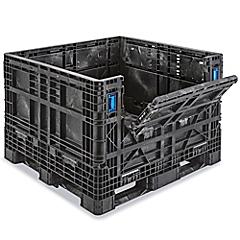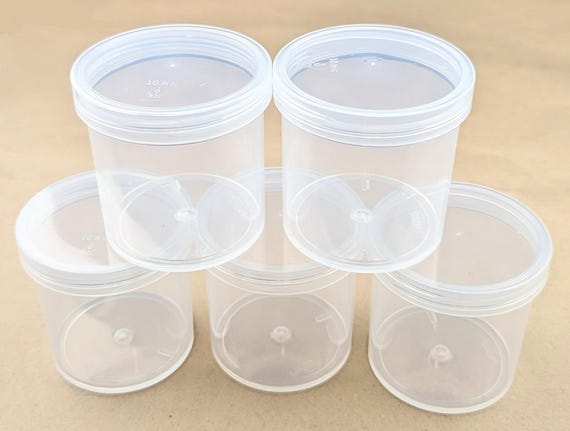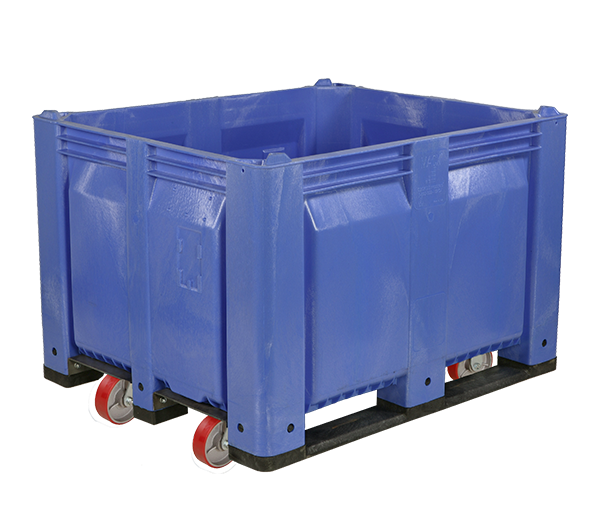Discover how reliable Bulk Plastic Containers can enhance your storage solutions
The Role of Mass Plastic Containers in Effective Recycling Practices and Sustainability
Mass plastic containers are indispensable to modern reusing efforts. Their design boosts the effectiveness of product collection and transportation, adding to sustainability objectives. These containers not just optimize space yet additionally assist in keeping an eye on contamination degrees. Nonetheless, their application is not without challenges. Recognizing the full scope of their influence reveals a complicated partnership between logistics and ecological responsibility that requires further expedition.
Understanding Bulk Plastic Containers
Bulk plastic containers function as a crucial element in different sectors, facilitating the storage space and transportation of goods. These containers are normally made from robust products such as high-density polyethylene (HDPE) or polypropylene, which give longevity and resistance to environmental elements. Their design commonly includes attributes like stackability and modularity, allowing for reliable use area throughout both storage space and transportation.
Industries such as agriculture, food handling, and manufacturing frequently use bulk plastic containers because of their lightweight nature and simplicity of handling. The containers can be found in numerous dimensions and configurations, accommodating the particular needs of various products. Their convenience prolongs beyond plain capability; they can also be customized with lids, takes care of, and classifying alternatives to boost use - plastic bulk containers. As an outcome, bulk plastic containers play a vital function in optimizing logistics and supply chain operations throughout several industries, thus adding to general effectiveness and cost-effectiveness
Benefits of Utilizing Mass Plastic Containers in Recycling
The application of mass plastic containers substantially improves the efficiency of the procedure when organizations focus on recycling efforts. These containers are designed to maximize space, enabling for the storage space and transport of bigger amounts of recyclable materials. This results in fewer trips to recycling facilities, thereby decreasing fuel intake and associated emissions.
In addition, mass plastic containers are long lasting and resistant to numerous ecological elements, guaranteeing that products continue to be shielded during handling and transit. Their light-weight design even more adds to lower transportation costs.
The uniformity of these containers helps with much better sorting and processing of recyclable products, which can enhance overall recycling rates. Organizations that adopt bulk plastic containers also show a commitment to sustainability, positively affecting their brand name picture. Inevitably, these advantages not only simplify reusing practices however likewise add to broader ecological objectives
Just How Bulk Plastic Containers Facilitate Material Collection
Efficient product collection is considerably enhanced by the use mass plastic containers, as they offer a organized and effective service for collecting recyclable products. These containers are developed to accommodate big quantities of materials, which simplifies the sorting and storage space procedure. Their stackable style makes the most of area utilization, making it easier for centers to arrange recyclables without clutter.
On top of that, mass plastic containers are weather-resistant and sturdy, enabling for outside positioning without deterioration. This resilience guarantees that materials remain protected till they are accumulated for handling.

The uniformity in shapes and size of these containers facilitates standardization across collection points, making it possible for much better monitoring of recyclable quantities. Their clear nature permits for simple visibility of contents, aiding in the tracking of contamination levels and assuring that only proper products are collected. Overall, bulk plastic containers play a critical role in improving the material collection procedure, consequently advertising reliable reusing methods.
Transport Performance and Environmental Impact
Transportation efficiency plays a vital role in the recycling procedure, specifically through the optimization of lots capacity wholesale plastic containers. By optimizing the volume of product delivered, companies can significantly minimize the number of trips required, thereby minimizing their carbon impact. This approach not just improves functional effectiveness however additionally contributes to much more sustainable environmental methods.

Enhancing Lots Capability
Although optimizing load capability is typically ignored, it plays a necessary role in improving transport efficiency and decreasing environmental impact in reusing methods. By maximizing the volume that mass plastic containers can hold, reusing operations can reduce the variety of journeys needed for transportation. This not just reduces gas usage yet also decreases the wear and tear on cars. Reliable lots monitoring enables facilities to utilize room effectively, guaranteeing that each transportation cycle is as effective as possible. Furthermore, well-optimized tons can lead to much better negotiations with logistics companies, potentially minimizing total expenses. Eventually, boosting load ability adds to a much more sustainable recycling system by fostering effective source usage and reducing waste produced throughout transportation.
Reducing Carbon Impact
As recycling procedures venture to reduce their ecological effect, minimizing the carbon impact related to transport arises as a vital goal. Bulk plastic containers play a vital role in attaining this purpose by enhancing lots effectiveness and maximizing logistics. Their light-weight yet sturdy design enables maximum freight space usage, decreasing the variety of journeys called for to move materials. By combining shipments, recycling centers can reduce gas consumption and greenhouse gas emissions. In enhancement, strategically situating recycling centers reduces transport ranges, additionally lowering carbon results. Using fuel-efficient cars and different power resources enhances overall sustainability. By integrating these practices, the reusing sector can substantially reduce its carbon impact, adding to a more lasting future.
Challenges in making use of Mass Plastic Containers

Contamination Concerns
Contamination problems stand for a considerable obstacle in the reliable use bulk plastic containers within reusing techniques. read this post here These containers usually accumulate residues from previous contents, causing mixed products that can impede the recycling procedure. Contaminants such as food waste, chemicals, or non-recyclable materials can endanger the integrity of the whole set, causing enhanced disposal prices and decreased reusing rates. In addition, incorrect cleaning or sorting can worsen these concerns, making it challenging for reusing facilities to refine materials successfully. The presence of contaminants not just affects the top quality of recycled items yet also weakens the total sustainability efforts focused on lowering plastic waste. Addressing these contamination obstacles is essential for improving the efficiency of bulk plastic container recycling.
Recycling Infrastructure Limitations
Inefficiency in recycling infrastructure presents substantial challenges for the effective monitoring of mass plastic containers. Numerous reusing centers do not have the capability to pop over to these guys refine large quantities of these containers effectively, causing raised hold-ups and expenses. In addition, insufficient arranging technologies usually lead to contamination, as bulk containers might be combined with other materials, complicating the reusing procedure. Minimal transportation alternatives likewise prevent the motion of mass plastic containers to appropriate reusing centers, bring about increased garbage dump waste. In addition, an absence of standard protocols for bulk container reusing develops complication amongst services and customers, better making complex initiatives to advertise sustainability. Resolving these facilities constraints is vital to improve recycling methods and make best use of the capacity of bulk plastic containers in a circular economy.
Ideal Practices for Carrying Out Mass Plastic Containers
When organizations think about implementing mass plastic containers in their recycling practices, they should prioritize a tactical strategy that boosts efficiency and decreases contamination risks. Picking the proper container dimension and kind is crucial to fit the quantity of materials being processed. Organizations should also develop clear labeling and signage to lead users on proper disposal techniques, decreasing complication and mistakes. Routine training sessions for personnel can additionally reinforce these methods, making certain everyone comprehends their roles in preserving recycling stability.
In addition, companies ought to implement a routine upkeep routine to examine and tidy containers, stopping the buildup of impurities. Partnering with regional recycling facilities can likewise simplify the collection process, making sure that materials are effectively refined. Companies should monitor and examine their recycling metrics, using this data to refine methods over time and promote constant enhancement in their sustainability initiatives.
The Future of Bulk Plastic Containers in Sustainable Practices
As companies progressively focus on sustainability, the role of bulk plastic containers in recycling practices is set to progress substantially. Advancements in products scientific research are bring about the development of recyclable and naturally degradable alternatives, improving the ecological benefits of bulk plastic containers. Additionally, the application of closed-loop systems will permit much easier collection and repurposing of these containers, minimizing waste and resource intake.
Technological improvements, such as smart monitoring systems, will allow companies to monitor the lifecycle of bulk containers, boosting effectiveness in reusing processes. As customer demand for sustainable techniques grows, services will likely adopt bulk plastic containers made for reuse and lasting value. In addition, cooperation between sectors and governments will cultivate the establishment of standard reusing methods, making certain that mass containers are efficiently integrated right into broader sustainability efforts. On the whole, the future of bulk plastic containers appears encouraging, with significant possibility for adding to a round economy.
Often Asked Questions
How Are Mass Plastic Containers Made and What Materials Are Made use of?
Bulk plastic containers are typically made from high-density polyethylene (HDPE) or polypropylene (PP) These materials are refined through injection molding or blow molding methods, resulting in resilient, lightweight containers appropriate for various storage and transport needs.
Can Bulk Plastic Containers Be Reused Numerous Times Before Recycling?
Yes, bulk plastic containers can be recycled several times prior to reusing. Their toughness and layout enable repeated usage in numerous applications, advertising sustainability and source performance while minimizing the demand for brand-new containers.

What Accreditations Exist for Mass Plastic Containers in Recycling?
Numerous qualifications for bulk plastic containers consist of the Recycling Partnership's certification, the Cradle to Cradle Certified ™ standard, and the Lasting Product packaging Union's standards, ensuring containers satisfy particular environmental and recyclability standards for efficient recycling.
Just How Do Bulk Plastic Containers Compare to Other Recycling Storage Options?
Bulk plastic containers use higher sturdiness and capability contrasted to other reusing storage space choices, decreasing the risk of contamination and facilitating effective transport. Their layout supports better organization, improving general performance in look at this web-site recycling procedures.
What Is the Lifespan of a Mass Plastic Container in Recycling Processes?
The life-span of a bulk plastic container in reusing processes normally ranges from 5 to 10 years, depending upon usage, material top quality, and ecological conditions, enabling for several cycles of usage prior to eventual disposal or recycling.
When organizations prioritize recycling efforts, the application of bulk plastic containers substantially enhances the performance of the procedure. Transportation performance plays an essential role in the recycling procedure, specifically through the optimization of tons capability in bulk plastic containers. The usage of mass plastic containers in recycling methods deals with substantial challenges, especially concerning contamination problems and constraints within reusing facilities. Contamination concerns represent a substantial challenge in the effective use of mass plastic containers within recycling practices. When companies take into consideration executing bulk plastic containers in their recycling practices, they ought to focus on a calculated technique that enhances effectiveness and decreases contamination risks.